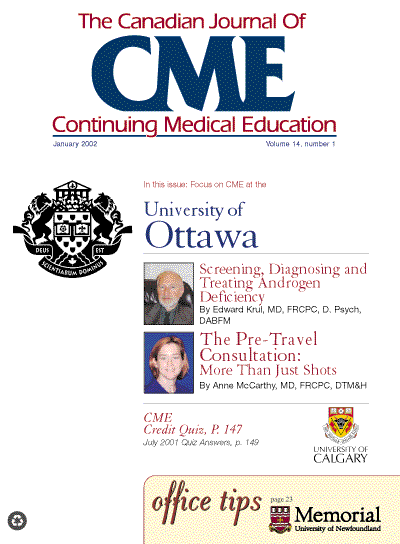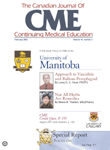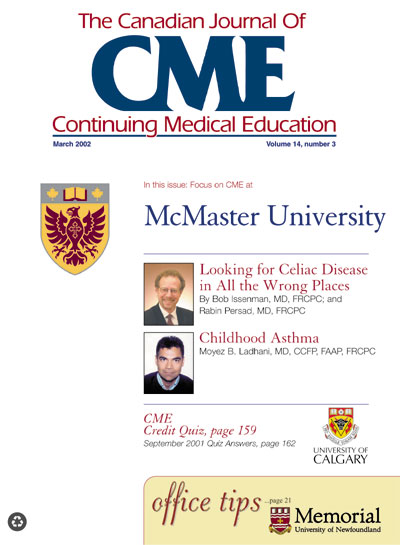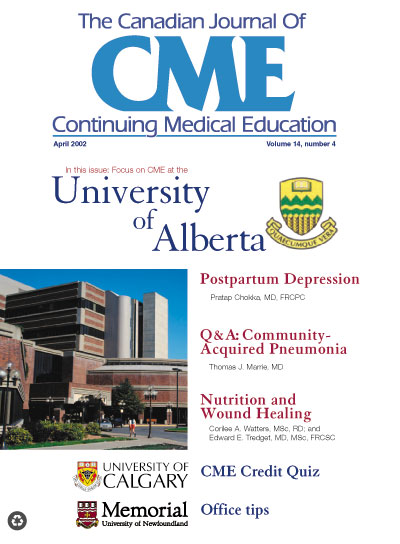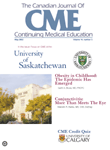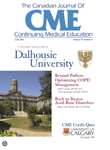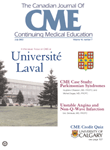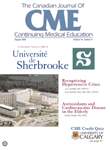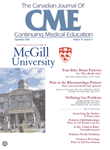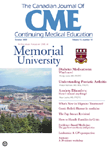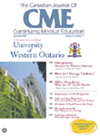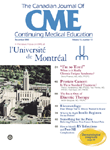The Canadian Journal of CME
2002 Back Issues
2001 • 2002 • 2003 • 2004 • 2005 • 2006 • 2007 • 2008 • 2009 • 2010 • 2011 • 2012
Jan • Feb • Mar • Apr • May • Jun
• Jul • Aug • Sept • Oct • Nov • Dec
January 2002
Workshop: How to Make a Difference in Just Three Minutes With Patients Who Smoke
Elizabeth A. Lindsay, PhD
An intervention that helps your patients stop smoking can have a greater impact on their health than almost any other treatment you provide. It is important to take the time to discuss stop-smoking options with your patients.
Androgen Deficiency
Edward Krul, MD, FRCPC, D. Psych, DABFM
With a careful and educated use of androgen replacement therapies, patients with androgen deficiency can live more productive and healthier lives.
The Pre-Travel Consultation
Anne McCarthy, MD, FRCPC, DTM&H
With guidance, health-care providers can assist travellers by providing up-to-date and preventive travel medicine advice, based on an individual risk assessment, using readily available resources.
Varicella Zoster And Bacterial Vaginosis In Pregnancy
Catherine C. Code, MD; and Alan J. Karovitch, MD, MEd, FRCPC
Primary-care physicians must be able to recognize varicella zoster and bacterial vaginosis to treat both the pregnant woman and her fetus.
Diagnosis and Management of Perinatal Infections
Andrée Gruslin, MD, FRCSC; and Bahauddin I. Sallout, SSOGB, MBBS
While not a threat in most cases, certain micro-organisms can have significant effects on fetal/neonatal morbidity and mortality, and pregnant women should be monitored for possible infections.
Assessing Hearing Disorders in the Young Child
Johnna A. MacCormick, MD, FRCSC
An early diagnosis of hearing loss is critical in young children, as management interventions must be initiated early to be successful.
Prevention of Colorectal Cancer
Martin S. Friedlich MD, MSc, MEd, FRCSC; and Hartley S. Stern MD, FRCSC, FACS
Although advances are being made in managing colorectal cancer when it is diagnosed, prevention should be the major focus.
Treating Adolescents: A Survival Guide
Peter Côté, BA, MDCM, CCFP; and Barry Dworkin, BSc (Hon), MDCM, CCFP.
Treating adolescents does not have to provoke anxiety. It can be a rewarding experience if one knows how to navigate these unchartered waters. This article identifies the three stages of adolescence and guides general practitioners on the best approach to handling office visits.
Do You Routinely Screen For Domestic Violence?
Patricia Morris, MD, CCFP
Violence crosses all ages, sexes, races, cultures and socioeconomic groups. There is such a high prevalence rate that family doctors will, on a daily basis, encounter more than one person with a past or present history of abuse.
The Feminization of Family Medicine: How is the Health-Care System Influenced?
Janet Dollin, MD, MDCM, CCFP
Preconceptions of women in medicine have persisted for centuries. This article examines both the positive and negative gender biases female physicians continue to face.
February 2002
Workshop: Infective Endocarditis
Davinder S. Jassal, MD; and John M. Embil, MD, FRCPC
Although rare, infective endocarditis is a serious condition that should not be overlooked, as it has a high morbidity and mortality rate if left untreated.
Approach to Vasculitis & Bullous Pemphigoid
Lorne D.C. Hurst, FRCPC
A patient’s history, physical examination and histological analysis are the keys to assessing unfamiliar skin conditions, such as vasculitis and bullous pemphigoid.
Not All Herbs Are Remedies
Meera B. Thadani, MSc(Pharm)
In order to better educate patients, family physicians must familiarize themselves with regulatory categories for herbal products.
Important Drug Interactions
Daniel S. Sitar, BSc(Pharm), MSc, PhD
Grapefruit juice, St. John’s wort and iron supplements are a few products that can have adverse reactions with prescription medications.
End-Stage Renal Disease: Arresting the Epidemic
Keevin Bernstein, MD, FRCPC
With the number of patients with end-stage renal disease increasing, renal and dialysis programs must begin promoting renal health and disease prevention to encourage early referral for nephrology care.
Neuropathic Pain: Mechanisms, Diagnosis and Treatment
Werner K. Ilse, MSc, MD, FRCPC
Many physicians face the challenging responsibility of treating chronic pain. Such treatment requires flexibility, determination and persistence on the part of the physician.
Bioterrorism
John M. Embil, MD, FRCPC; and Lindsay E. Nicolle, MD, FRCPC
While acts of bioterrorism have been the subject of discussion for some time, they were always perceived as a possibility rather than a reality. Recent events have shown the threat of bioterrorism can be very real.
Strategies For The Control Of Influenza Infections
Gregory William Hammond, BSc, MDCM
While overall prevention of influenza infection is not yet possible, control strategies continue to improve. The most important strategy remains a vigilant awareness program, accompanied by a yearly vaccination program.
What's New: the World of Hepatitis C
Karen E. Doucette, MD, FRCPC; and Kelly D.E. Kaita, MD, FRCPC
It is anticipated the next decade will bring further advances and
improvements in the management of people chronically infected with
hepatitis C. Meanwhile, primary prevention of infection and slowing the rate of progression of fibrosis in those already infected remain important goals.
Methicillin-resistant Staphylococcus aureus
John M. Embil, MD, FRCPC; Karen Olekson, RN, CIC; Brenda M. Dyck, BScN, CIC; Judy A McLeod, RN, CIC; Debbie R. Ormiston, HRT; and John Conly, MD, FRCPC
Hand Hygiene
Judy A. McLeod RN, CIC; and John M. Embil MD, FRCPC, FACP
Studies have shown that health-care professionals wash their hands half as often as they should. Those practicing in community-based and acute-care settings need to consider advances in hand hygiene to minimize the spread of microorganisms among patients.
The Truth About Drug Allergies
Richard Warrington, MB, BS, PhD, FRCPC
Drug allergies are common and can be best understood and diagnosed by thinking in terms of the immune mechanisms involved in the reactions they cause.
March 2002
Workshop: The Confused Child: with a Headache!
Migraine is the most common cause of childhood headache requiring medical attention. A thorough approach to diagnosis should include a careful history and physical examination to exclude other organic etiologies.
Jonathan Gilleland, MD; and Cynthia M. Cupido, MSc, MD, FRCPC, FAAP
Looking for Celiac Disease in All the Wrong Places
Bob Issenman, MD,FRCPC; and Rabin Persad, MD, FRCPC
The average adult with celiac disease has symptoms for 10 years before diagnosis. The disease is far more common than previously thought.
What’s New in Diabetes
Sarah Capes, MD, FRCPC
This article provides an overview of new drugs for Type 2 diabetes, new therapies for Type 1 diabetes, new evidence for cardiovascular disease prevention in diabetes and new approaches to preventing diabetes.
Childhood Asthma
Moyez B. Ladhani, MD, CCFP, FAAP, FRCPC
The diagnosis of asthma in children may not be made during the first visit, but only after recurrent symptoms are present.
“Matters of the Heart...” Feeding and Hydration in Palliative Care
Elizabeth J. Latimer, MD, CCFP, FCFP
Decisions about feeding and hydration in patients with advanced illness are heavily influenced by deeply held values, beliefs and emotions. Careful assessment and sensitive conversations with the patient and family are essential.
Common Pediatric Indications for Referral to Otolaryngology
Doron Sommer, MD, FRCSC; and Vito Forte, MD, FRCSC
Although myringotomy/tympanostomy tube
insertion and tonsillectomy/adenoidectomy are the most common surgical procedures, their
indications are still evolving and awaiting the
completion of further trials.
The F.P.’s Role in the Management of Chronic Kidney Disease
David N. Churchill, MD, FRCPC, FACP
Family physicians often are active in managing moderate chronic kidney
failure, however, they take on a co-management role in cases of severe chronic kidney disease and kidney failure requiring dialysis.
Guest CME: CVD Learning Needs and the Primary-Care Physician
Vernon Curran, PhD; Tanya Noseworthy, BSc; Fran D. Kirby, MEd; and Lydia B. Hatcher, MD, CCFP
The results from this survey provide important information, which may assist CME program providers in designing effective instructional activities.
April 2002
Workshop: Postpartum Depression: Part 1
Pratap Chokka, MD, FRCPC
Physicians should routinely screen women for affective symptoms during pregnancy, especially in the postpartum period.
Answering Questions About Community-Acquire Pneumonia
Thomas J. Marrie, MD
There is considerable variation in the management of community-acquired pneumonia, and family physicians need a firm grasp of these approaches to help their patients.
Nutrition and Wound Healing
Corilee A. Watters, MSc, RD; and Edward E. Tredget, MD, MSc, FRCSC
Clinicians need to be aware of the nutritional and metabolic factors affecting wound healing and what preventive and corrective therapies can be used to optimize wound healing.
Biologic Therapies in Crohn’s Disease: The Next Generation
Lana Bistritz, MD; and Bruce R. Yacyshyn, MD, FRCPC
As we begin to understand the inflammatory pathways of Crohn’s disease, new agents that more specifically act on these pathways are becoming available.
CME Needs Assessment Using Standardized Patients
Paul Davis, MB, ChB, FRCP, FRCPC; Anthony S. Russell, MA, FRCPC, FRCP; Manouchehr Javidan, MD, MSc, FRCPC, DABPN; and Sally Mack, B.Comm, APMR
Recognizing the clinical challenges associated with headache, a study at the University of Alberta sought objective evidence about family physicians’ needs for a CME program on headache.
Guest CME: Management of Overweight Patients
Robert R.M. Dent, MDCM, FRCPC
Research shows even small reductions in weight are associated with significant improvements in obesity-related medical complications. This, however, requires long-term, hard work on the part of your patients.
May 2002
Universitty of Saskatchewan
Workshop: Good Question! Knowing What to Ask
Posing good questions is the key to efficient computer-based medical practice.
H. Jay Biem MD, MSc, FRCPC; and Sandra R.D. Biem MD, FRCSC
Obesity in Children
The physicians role in caring for the overweight or obese child is to provide advice and encouragement, and to monitor the child for associated complications and intervene when necessary.
Garth A. Bruce, MD, FRCPC
Conjunctivitis: More Than Meets the Eye
The family physician is the gatekeeper for the diagnosis and management of conjunctivitis. Differentiating conjunctivitis from other, more serious causes of non-traumatic red eye can save the patient from catastrophic visual loss.
Malcolm R. Banks, MB ChB, Do(Eng)
Breaking Down Blunt Ocular Trauma
Blunt ocular trauma involves the orbital and ocular structures coming into contact with a high-speed object, such as a hockey puck or fist.
Dan Ash, MD, BA, FRCSC, FACS, FAAO
Advance Directives for Decision-Making in Health-Care
As family physicians know their patients the longest and usually the best, they are especially well-suited to assist with advance directives.
Keith Ogle, MD, CCFP
Guest CME: Postpartum Depression: Part 2
Pratap Chokka, MD, FRCPC
Insomnia: Asking the Right Questions
James McFarlane, PhD, ABSM
June 2002
Dalhousie University
Beyond Puffers: Optimizing COPD Management
COPD is a common chronic respiratory disease that all family physicians should feel comfortable managing. Recent consensus guidelines provide assistance with management decisions.
Marie Laryea, MD, CM; and Paul Hernandez, MD, CM, FRCPC
Acid-Base Disorders
Underlying disease processes frequently give rise to acid-base disorders, and understanding these disorders may assist clinicians in diagnosing and treating patients.
Mary-Lynn, MD, CCFP(EM)
Head Trauma
Patients suffering head trauma are commonly seen by family physicians. It is useful to distinguish between primary and secondary injuries in order to understand the pathophysiology of head injury.
P. Daniel McNeely, MD; and David B. Clarke, MD, CM, PhD, FRCSC, DABNS
Approach to the Comatose Patient
Although management of comatose patients can be intimidating, it need not be complicated. A simple, systematic approach will go a long way to ensure adequate stabilization, diagnosis and initial empiric treatment.
Sam G. Campbell, MB, BCh, CCFP(EM); and C. William McCormick, MD, FRCPC
Social Anxiety Disorders: A Syndrome with Many Faces
Joy Albuquerque, MD, FRCP; and Dorian Deshauer, MD, FRCP
Making Yourself Understood: The Purpose of Communication
Philip G. Winkelaar, MD, BSc, FCFP, DGM
July 2002
Universite Laval
CME Workshop: Parkinsonian Syndromes
Given the quick progression of certain parkinsonian syndromes and how quickly patients lose their mobility and become bedridden, they should be treated quickly by an interdisciplinary team.
Guylaine Chiasson, MD, FRCPC; and Michel Dugas, MD, FRCPC
Unstable Angina and Non-Q-Wave Infarction
While treatment options are increasing and improving constantly, each patient is unique, and the treatment of unstable angina continues to be a challenge for the clinician.
Eric Demeule, MD, FRCPC
Atypical Antipsychotics and Weight Gain
Behavioural intervention with a weight reduction program is often extremely difficult in psychiatric patients. Preventing weight gain in this already at-risk population is the best strategy.
Christian L. Shriqui, MD, MSc, CSPQ, FRCPC
Cutaneous Signs of Physical Abuse in Children
All medical who treat children are likely to see victims of physical abuse. The first signs are very often cutaneous lesions due to trauma, and they must be properly identified.
Jean Labbe, MD, FRCPC
West Nile Virus: A Global Problem
Public education on the existence of West Nile Virus, its mode of transmission and how to protect oneself against it are essential to stopping the spread of WNV.
Helene Senay, MD, FRCPC
August 2002
Delivering Bad News: What to do, what to say
Delivering bad news is part of a physician’s function.
Physicians must understand and use the medical consultation format in order to communicate properly with their patients.
Sophie Laflamme, MD, FRCPC
Recognizing Hypertensive Crises
Hypertensive crises are encountered primarily by first-line physicians, in either emergency or clinical settings. There are currently a number of effective drugs available that help greatly reduce the morbidity associated
with this condition.
Luc Lanthier, MD, FRCPC; and Danielle Pilon, MD, MSc, FRCPC
Antioxidants and Cardiovascular Disease in the Elderly
Type 2 diabetes in elderly patients rarely results in mortality as a direct
result of a glycemic imbalance — the most common cause of death in patients
with atherosclerotic cardiovascular disease. This article discusses the role
of oxidation and antioxidants in vascular disease among elderly diabetics.
Daniel Tessier, MD, MSc
Improving Treatment for Premenstrual Syndrome
Because this chronic problem usually persists until women reach menopause,
and the severity of symptoms is different in each patient, treatments must
be tailored to meet individual patient’s needs.
François Lajoie, MD, FSOGC, FACOG, CSPQ; and Sophie Desindes, MD, LMCC, FRCPC, CSPQ
September 2002
CME Workshop:
What to do about Middle Age Issues?
What are middle age issues and what can physicians do to help their patients?
Mark Yaffe, MDCM, MCISc, CCFP, FCFP
Understanding and Managing Pain in the Rheumatology Patient
Physicians are now focusing their efforts on understanding and reducing pain.
Abdulaziz Almahrezi, MB, ChB, CCFP; and Mary-Ann Fitzcharles, MB, ChB, MRCP(UK), FRCP(C)
Information for Patients
“Take your finger out of your eye”
Common Issues in Pediatric Ophthalmology
How do you deal with pediatric patients and their eye exams?
Conrad C. Kavalec, MD, FRCS(C), DABO
Winter Skin Care
Dry skin, it’s everywhere.
Kevin Pehr, MD
Natural Gas: Myths and Facts
The truth about natual gas and how to deal with it.
Barry Mishkin, MD, FACP; Daniel Mishkin, MD, CM, FACP; and Seymour Mishkin, MD, CM. FRCP(C)
Neurofibromatosis: Type 1 in Childhood
A review, from the childhood perspective, on NF Type I.
June Ortenberg, MD, FRCP(C), ABP
Penile Problems in Pediatrics
Correct identification of penile problems is usually possible by careful physical examination and is essential to avoid related complications.
J.L. Pippi Salle, MD, PhD; and Roman Jednak, MD
Self-Graffiti: Is it all about Self-Image or Self-Destruction?
Physicians should understand the growing phenomenon of body art, and the potent infectious complications “attached” to this trend.
Earl E. Rubin, MD, CM
Four Common Rheumatological Consultations Based on Misunderstandings
Morton Kapusta, MD, CM, FRCP(C), FACP
Defining and Diagnosing Hematuria
Only a tiny minority of patients with benign hematuria will have a condition that is life-threatening or warrants treatment.
Adrian Fine, MD, FRCPC, FRCP (Glasgow)
Nosing Around: Dealing with Nasal Polyps
Many of the “bad sinus” patients with recurrent acute or chronic sinusitis most likely have underlying nasal polyps as the root of their problem.
Peter Spafford, MD, FRSC
October 2002
CME Workshop:
Autism: A 20-minute workshop
The stereotype of the withdrawn, mute child with self-absorbed, repetitive
actions does not accurately reflect the spectrum of symptoms seen in
clinical practice today.
Victoria Crosbie, MD, FRCPC
Leukemia: A GP’s perspective
Chronic lymphocytic leukemia (CLL) is the most common adult leukemia in the
Western world.
Kuljit Grewal, MD, FRCPC
Anxiety Disorders: Have I missed anything?
Anxiety is ubiquitous. It is present as part of many physical and
psychiatric disorders. These disorders carry a lifetime morbidity and, in
some cases, are fatal.
Nizar Ladha, MD, FRCPC, DABPN
New Medications in Diabetes.
Type 2 diabetes has become one of the major public health issues in North
America and around the world.
Pradip Joshi, MD, FRCPC
Understanding and Managing Psoriatic Arthritis
Epidemiological studies have clearly demonstrated that psoriatic arthritis
is a separate disease entity, with its own demographic, radiologic, and
clinical features.
Proton Rahman, MD, MSc, FRCPC
Q & A: What’s best for migraines.
In the past decade, progress has included the introduction of other
triptans, new methods or recommendations for their administration and a
realization of the impact that migraines have on peoples’ lives.
William Pryse-Phillips, MD, FRCP, FRCPC
How to Handle Families in Crisis
The Role of family meeting
Nowhere does the term family physician live up to its name more than at a
family meeting.
William Eaton, MD, CCFP, FCFP
A Gap too wide: The need to transfer Evidence into practice.
Walter W. Rosser, MD, CCFP. FCFP, MRCGP(UK)
Pap smears: a review of what's new.
Catherine Popadiuk, MD, FRCS
Comic Relief: Humor in medicine
William Eaton, MD, CCFP, FCFP
November 2002
CME Workshop: How do I Managing Cirrhosis?
Almost 40% of patients with cirrhosis are asymptomatic at diagnosis but the majority become symptomatic as a consequence of the disease’s progression and the development of complications.
Cameron Ghent, MD, FRCPC
Osteoporosis: Not Just for Women Anymore
Although the prevalence of osteoporosis is higher in women, recent population-based studies demonstrate that men are also vulnerable to bone loss, particularly later in life.
Lisanne Laurier, MD, PhD, FRCPC
How do I perform procedures in my office: What the GP should Handle
As family doctors withdraw or are forced out of hospital practice, they tend to stop doing procedures or may not recognize that many procedures can easily and effectively be done in an office setting.
Stephen Wetmore, MD, MCISc, FCFP
Recognizing & treating major depression disorders: A GPs Perspective
One in every six people will develop an episode of major depression over the course of their lifetime. An estimated three million Canadians are suffering from depression.
John Jordan, MD, MCISc, CCFP, FCFP
Adverse Drug Reactions: When the Solution Becomes the Problem
Appropriate use of medication provides physicians with the ability to cure many infectious diseases and to control many other diseases. A major problem confronted by primary-care physicians on a daily basis is the risk of adverse drug reactions.
Michael Rieder, MD, PhD, FRCPC, FAAP, FRCP(Glasg)
Dystonia: A Real Pain in the Neck
Dystonia is a neurologic syndrome characterized by involuntary, sustained muscle contractions of opposing muscles which cause twisting movements or abnormal postures.
Mandar Jog, MD, FRCPC and Mary Jenkins, MD, FRCPC
Hemochromatosis: How Many Cases are we Missing?
Hereditary hemochromatosis is a genetic condition in which more iron is absorbed than is required by the body. It is estimated that nearly one in 200 people with Northern European ancestry have the typical genetic pattern associated with this condition.
Helen Harrison, RN(EC) and Paul Adams, MD
Catering to Patients: When Enough is Enough
Having friends and colleagues as patients adds a rich dimension to medical practice, but it also brings with it the potential for serious relationship boundary issues and conflicts.
James Rourke, MD, CCFP(EM), FCFP, MCISc, and Leslie Rourke, MD, CCFP, FCFP, MCISc
Editorial, The perils of convergence
By Jim Silcox, MD, FRCSC
University Briefs
Office Tips
Presented by Vernon Curran, PhD and Memorial University of Newfoundland
• Videoconferencing
• Post-Exposure Prophylaxis
You Asked About
Presented by Wayne Olsheski, MD and the University of Toronto
• Migraines
• Hypertension
Up Close:
A Look at Dermatological Diagnosis
Presented by Catherine McCuaig, MD, FRCPC and l’Université de Montréal
CME Credit Quiz
Upcoming
Calendar
Upcoming events at the University of Western Ontario
CME Workshop
“I’m so Tired” - When Does a Patient Really Have Chronic Fatigue Syndrome (CFS)?
By Denis Phaneuf, MD, MSc, FRCPC
In general practice, 20% to 27% of patients present with fatigue lasting more than two weeks, but varying studies indicate that only 1% to as low as 0.04% of this population will actually have CFS.
Feature 1
Prostate Cancer: Is There Standard Treatment?
By Fred Saad, MD, FRCSC, Paul Perrotte, MD, FRCSC, and Pierre I. Karakiewicz. MD
The difference in natural history of prostate cancer precludes a standardized treatment for all men. Instead, treatment recommendation requires a tailored approach, where the natural history of the tumour is considered alongside the patient’s life expectancy and his quality-of-life preferences.
Feature 2
The Ins & Outs of Diuretic Therapy
By André Gougoux, MD, FRCPC
Diuretics have become frequently prescribed drugs for the treatment of edematous disorders and arterial hypertension. One must understand their mechanisms of action to anticipate the potential complications associated with their use.
Feature 3
Issues in Rheumatology
By Marie Hudson, MD, FRCPC; and Michael Starr, MD, FRCPC
How to diagnose Sjögren’s syndrome; Does NSAID use affect cardiovascular risk?; Who should be screened for osteoporosis?; and, The differential diagnosis and treatment of Rayneaud’s phenomenon.
Feature 4
What is the Right Insulin Regimen for my Patient?
By Jean-Pierre Hallé, MD, FRCPC; and Donad Breton, MD, FRCPC
Q&A on improving your patient’s insuling regimen; Benefits of using fast-acting, short-duration insulin analogues; B.I.D. regimens and mixed insulins; and The disadvantages of intermediate and long-acting insulin preparations.
Feature 5
Something for the Pain
By François Lehmann, MD, CCFP, FCFP
Issues in Rheumatology
Treating patients with chronic pain requires patience, as the modalities used are unlikely to eradicate the pain. Most patients can achieve relief through a variety of therapeutic approaches, but they must be made to understand that a certain level of pain will persist.
Feature 6
How to Identify RV Infarctions and Post-MI Complications
By Arsène-J. Basmadjian, MD, MScSomething for the Pain
Right ventricular (RV) infarction requires special attention in order to recognize and treat it accordingly. The mechanical complications of myocardial infarction generally have a rapid clinical course with high mortality and require early diagnosis in order to properly manage the patient and refer him to a centre with cardiac surgery.
Editorial, Tacit Knowledge and Self-Directed Knowldge (SDL) : A Direct Relationship
By Dr. Robert L. Thivierge, MD, FAAP, FRCPC
Office Tips
Presented by Vernon Curran, PhD and Memorial University of Newfoundland
• Dealing with Difficult Patients
• Tax Time: Offsetting Capital Gains
You Asked About
Presented by Wayne Olsheski, MD and the University of Toronto
• Long-acting beta agonists
• ECG stress-testing
Up Close: A Look at Dermatologic Diagnosis
Presented by Catherine McCuaig, MD, FRCPC and l’Université de Montréal
CME Credit Quiz
Upcoming
Calendar
Upcoming events at l’Université de Montréal

